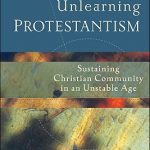Schlabach, Gerald W. Unlearning Protestantism: Sustaining Christian Community in an Unstable Age. Brazos Books, 2010. ISBN: 9781587431111.
Gerald W. Schlabach is an associate professor of theology and director of the Justice and Peace Studies program at the University of St. Thomas in Minnesota. He is the founder and currently serves as the executive director of Bridgefolk, which is a movement of Mennonites and Roman Catholics who come together to explore each other’s practices and honor each other’s contributions to the mission of Christ’s church. Nurtured in the Mennonite tradition, Schlabach became a Benedictine oblate in 1997 in part to embody his growing commitment to Catholic Christianity. Schlabach deepened that commitment in 2004 when he was received into the Roman Catholic Church. He continues to respect both traditions in his own faith practices through his membership of St. Peter Claver Catholic Church and associate membership at Faith Mennonite Church. He is the author of several books including Unlearning Protestantism: Sustaining Christian Community in an Unstable Age; For the Joy Set Before Us: Augustine and Self-Denying Love; And Who Is My Neighbor?: Poverty, Privilege and the Gospel of Christ; and To Bless All Peoples: Serving with Abraham and Jesus (Herald Press, 1991). For more information, visit his website or view his faculty profile.
Unlearning Protestantism: Sustaining Christian Community in an Unstable Age is a complex book that evolved over many years. Schlabach expressed hesitancy to publish the work after fully converting to Roman Catholicism, but chose to do so at the urging of colleagues. The book is necessarily autobiographical at times, but constantly seeks to speak much more broadly and to encourage those within the Catholic and Protestant traditions to find their way forward in the practices of stability and virtues of fidelity. In the current unstable age, which many term postmodern, the way forward for Christian traditions in all of their many shapes is via the commitment of adherents to their respective communities. Voices of loyal dissent must be heard and valued, but are helpful in generating needed reform only as they remain a part of the tradition. The outcome of this shift in thinking should be an increase in Christian unity and in openness to learning from the other traditions as well as one’s own.
The author writes for two audiences: Roman Catholic and Protestant. Protestant readers will be thankful to learn that he is not writing to encourage them to follow his path and join with the Roman Catholic tradition, yet will likely struggle with his heavy reliance upon the Second Vatican Council. Personally, I found the fourth chapter, “Stability in Hard Times: Loyal Dissent,” the most important and hopeful. In those pages he offers the stories of Yves Congar, Dorothy Day, Dom Helder Camara, Oscar Romero, and Joan Chittister as powerful examples for his premise that dissent is meaningless outside of communion.
So What?
How do Protestant churches and denominations make room for those who feel compelled to speak in new ways or to encourage reform? How can a desire to include rather than exclude such persons slow the rate of fragmentation and church (and denominational) splits?
What have you learned from someone within your tradition who chose to remain despite having a significant difference of opinion over a prescribed practice or policy?
Do you think an increased attentiveness to stability among all traditions who seek to follow Christ will lead to greater Christian unity? Why or why not?

